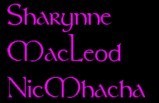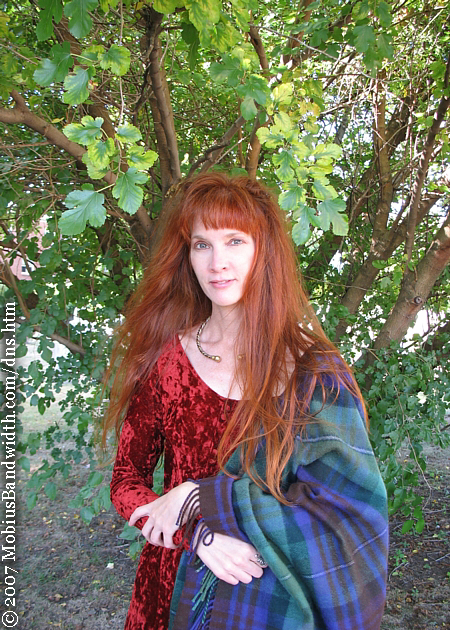
 is a Celtic scholar, writer and teacher, Gaelic singer and shamanic practitioner of Scottish, Irish and Welsh ancestry, and a direct descendant of Clan MacLeod, long recorded in ancient tradition to have connections with (and blood of) the Aes Sidhe or Fairy Folk. She has studied Celtic languages, religion and mythology through Harvard University and is a Faculty Member of the Celtic Institute of North America.
is a Celtic scholar, writer and teacher, Gaelic singer and shamanic practitioner of Scottish, Irish and Welsh ancestry, and a direct descendant of Clan MacLeod, long recorded in ancient tradition to have connections with (and blood of) the Aes Sidhe or Fairy Folk. She has studied Celtic languages, religion and mythology through Harvard University and is a Faculty Member of the Celtic Institute of North America.
Sharynne has presented work at the University of Edinburgh in Scotland, University College Cork in Ireland, Smith College, the University of Massachusetts, the Harvard Celtic Colloquium, the Ford Foundation’s Celtic Lecture Series and the Harvard University Graduate Study Group on Ancient Magic and Religion.
Sharynne has been practicing and teaching Celtic spirituality and shamanism for well over a decade, and has presented workshops at the Omega Institute, Kripalu Center and Rowe Center. Her spiritual tradition is based upon the native wisdom and practices of ancient Europe, her ancestral lineage, and the powerful teachings of Irish and Welsh wisdom texts. She utilizes sacred songs, prayers and chants in the Celtic languages as a bridge to the Otherworld, invoking a powerful memory of the wisdom we once knew.
In addition to her academic and spiritual training and teaching, Sharynne is a professional singer and songwriter who plays a variety of woodwind and stringed instruments -recently doing a stint with the group Trouz Bras (traditional Celtic music of Brittany) and with the upcoming group Devandaurae (Celtic, medieval and tribal / Otherworldy music and songs). She also performed with The Moors (Celtic / medieval trance rock) whose 1998 release won Best CD of the Year in Boston (Noise Magazine) with stunning press in The Boston Globe, The Boston Phoenix and Guitar Player Magazine and airplay in the United States, Canada, Europe and the Near East.
Sharynne has written feature articles for numerous magazines, and her original research into ancient Celtic religion has been published by Harvard University Press and the University of Edinburgh (School of Scottish and Celtic Studies). She is the author of Queen of the Night: Rediscovering the Celtic Moon Goddess (Red Wheel / Weiser), soon to be followed by another work exploring the history of the Divine Feminine in Europe.
Sharynne has studied Old Irish, Scottish Gaelic, Cornish and Welsh, and sings in the modern and medieval Celtic languages. Her areas of expertise include ancient Celtic myth and ritual, shamanism, traditional Scottish folk magic, the original lore of Avalon, and early Pictish traditions. Her ancestors include the Kings of Tara, the Earls of Ross and Moray, and the royal houses of Dalriada and the Picts, as well as Uther Pendragon and Anna Morgawse (sister of King Arthur). She was born on the eve of Lugnasad.
Sharynne has also studied Andean shamanism with master shaman Don Martín Pinedo, and in that tradition has been granted the Rites of the Pampamesayoq, a type of shaman who specializes in rituals honouring the Earth and the Divine Feminine.

Dún na Sídhe, 'The Fortress of the Sidhe,' includes the Old Irish word 'síd', which many
will recognize as having to do with the Sidhe or Fairy folk, and their sacred hills or
mounds. It is thought that 'síd' may be derived from a word meaning 'seat,' since the
sacral seat of kingship was sometimes perceived as existing on top of a sacred hill.
These hills were also the sacred abode of the síd-dwellers, the Old Gods of Ireland.
The word 'síd' has a secondary meaning of 'peace.' Tomás O'Cathasaigh suggests this came about in response to the first meaning, and that it refers to 'the peace which comes from a right relationship with the Otherworld.' It is important to honour the gods and the spirits, as a first step towards earning and receiving their gifts and blessings. Our relationship with the Otherworld is reciprocal.
Dún na Sídhe is an Old to Middle Irish spelling, which would be pronounced
'doon nah shee-thuh', the 'th' sounding as in the English word 'bathe.'
For ease in common usage, though, we suggest 'doon na shee.'

Please email for new postal address.